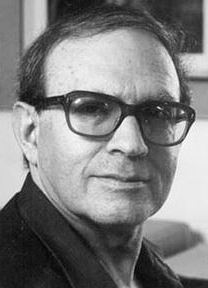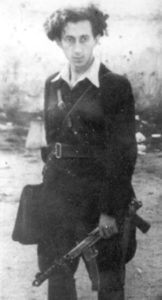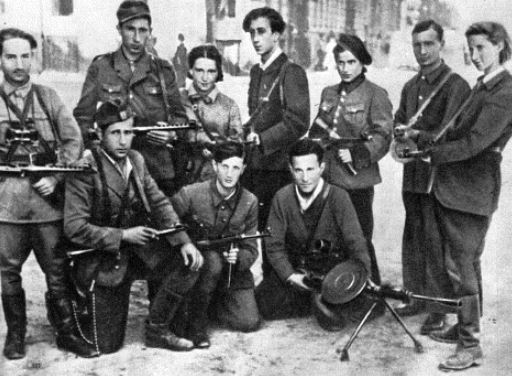Quantum Physicist and IDF Commander

Yuval Ne’eman
Yuval Ne’eman (1925-2006) was born in Tel-Aviv. His grandfather Aba Ne’eman had made aliyah to Yaffo from Lithuania as an eighteen year old, and was later among the first 66 families which settled and co-founded the city of Tel-Aviv. His grandfather also set up the city’s first electrical generator, and built some of its first factories. This may be what inspired Yuval to study mechanical engineering. He enrolled at Technion at age 15. At the same time, he joined the Haganah, and would fight valiantly in Israel’s Independence War, rising to the rank of commander of the Givati Brigade. Having spent several years living in Egypt with his parents as a child, Ne’eman spoke Arabic fluently and served as a liaison to Israel’s Mizrachi Jews, helping to settle them in the new country. In the mid-1950s, Ne’eman played a key role in the IDF’s operational command, developed its reverse mobilization system, and wrote Israel’s first defense doctrine. Meanwhile, he joined Israel’s Nuclear Energy Commission and oversaw the development of Israel’s nuclear capabilities. While serving as IDF attaché in London, he earned his PhD in physics. The following year he published his classification system for hadrons, laying the foundation for the quark model of quantum physics (proposed by recent Jews of the Week Murray Gell-Mann and George Zweig). Ne’eman returned to Israel in 1961 to direct the Soreq Nuclear Research Centre, one of the most important R&D facilities in Israel. He retired from the IDF with the rank of colonel, and founded Tel Aviv University’s School of Physics and Astronomy in 1965. Ne’eman directed it for the next seven years, then became president of he whole university. After this, he directed its Sackler Institute of Advanced Studies for nearly two decades. Ne’eman also co-directed the Center for Particle Theory at the University of Texas in Austin. A big believer in space exploration, he founded the Israel Space Agency in 1983 and chaired it until his death. He was chief scientist of Israel’s Defense Ministry in the 1970s, which opened the door for him to enter politics. Ne’eman founded the right-wing Tehiya party in response to Israel’s peace treaty with Egypt. He was elected to the Knesset in 1981 and became the country’s first Minister of Science and Technology. He continued to serve in the Knesset for over a decade. Among his many awards are the Israel Prize, the Wigner Medal, and the Albert Einstein Prize. He was also a member of the National Academy of Sciences. Ne’eman wrote a layman’s book on quantum physics called The Particle Hunters, which has been described as “the best guide to quantum physics at present available.”
Words of the Week
… Most of my people think as I do, but they’re afraid to say so… we suffer because of our Arab brothers, but we are also dependent on them. It’s a bizarre situation because the Arab countries don’t really care what happens to the Palestinian people. The only assistance that we have ever received from any country was from the ‘Zionist enemy.’
– Muhammad Zahrab, Palestinian Arab scholar

 Abel “Abba” Kovner (1918-1987) was born in what is today Belarus and grew up in Vilnius (then part of Poland). As a young man, he was a member of HaShomer HaTzair, the Zionist youth movement. When the Nazis invaded Vilnius in 1941, Kovner escaped to a convent, but soon returned to the Vilna Ghetto to organize a Jewish resistance. At the start of 1942, Kovner secretly published a manifesto inside the Ghetto to inspire the Jews to fight back, writing that it was better to die than “go like lambs to the slaughter”. Along with several other young men, Kovner formed the United Partisan Organization, possibly the first armed underground Jewish group in Nazi Europe. Before they could launch their first large-scale attack, the Vilna Ghetto was liquidated in 1943, forcing the group to flee to the surrounding forests. From there, they launched a guerrilla warfare campaign against the Nazis. The small group began calling themselves “the Avengers” (HaNokmim) and were successful enough to draw the attention of the Red Army. They would go on to coordinate with the Soviets to crush the Nazis in Eastern Europe. Once the fate of the Nazis was sealed towards the end of 1944, Kovner was among the founders of a new group, called Bricha (“Escape”), which worked to get Jewish refugees out of Europe and to the Holy Land. Over the next couple of years, they would successfully move 250,000 Holocaust survivors to Israel. Having seen first-hand the horrific devastation inflicted by the Nazis, Kovner yearned for revenge. He started yet another group, called Nakam (“Vengeance”), seeking to punish Germany for the Holocaust. “Plan B” was to poison the water supply in Allied prisoner-of-war camps where Nazi SS soldiers were kept. The far more controversial and shocking “Plan A” was to poison the water supplies of several major German cities in order to kill 6 million Germans, one for each Jew lost in the Holocaust. Thankfully, Plan A was soon abandoned, though Kovner was still arrested by the British and held in a Cairo prison for several months. He did aim to accomplish Plan B, and Nakam members infiltrated a POW camp bakery in April 1946, coating the loaves of bread with arsenic. Over two thousands German soldiers fell ill, though no deaths were reported. In December 1947, Kovner joined the Haganah and fought in Israel’s Independence War as a captain of the Givati Brigade. Following this, he lived out the remainder of his life in a kibbutz, working tirelessly to strengthen the nascent state. He also helped to design several Holocaust museums, and testified at the Eichmann trial. More famously, Kovner wrote a series of poetry books (in Hebrew and Yiddish) describing the struggles he faced during the Holocaust and in Israel’s early years. This made him one of the country’s most celebrated poets and writers. For this, he won the Israeli Prize for Literature in 1970. A heavy smoker, Kovner succumbed to tracheal cancer before his 70th birthday.
Abel “Abba” Kovner (1918-1987) was born in what is today Belarus and grew up in Vilnius (then part of Poland). As a young man, he was a member of HaShomer HaTzair, the Zionist youth movement. When the Nazis invaded Vilnius in 1941, Kovner escaped to a convent, but soon returned to the Vilna Ghetto to organize a Jewish resistance. At the start of 1942, Kovner secretly published a manifesto inside the Ghetto to inspire the Jews to fight back, writing that it was better to die than “go like lambs to the slaughter”. Along with several other young men, Kovner formed the United Partisan Organization, possibly the first armed underground Jewish group in Nazi Europe. Before they could launch their first large-scale attack, the Vilna Ghetto was liquidated in 1943, forcing the group to flee to the surrounding forests. From there, they launched a guerrilla warfare campaign against the Nazis. The small group began calling themselves “the Avengers” (HaNokmim) and were successful enough to draw the attention of the Red Army. They would go on to coordinate with the Soviets to crush the Nazis in Eastern Europe. Once the fate of the Nazis was sealed towards the end of 1944, Kovner was among the founders of a new group, called Bricha (“Escape”), which worked to get Jewish refugees out of Europe and to the Holy Land. Over the next couple of years, they would successfully move 250,000 Holocaust survivors to Israel. Having seen first-hand the horrific devastation inflicted by the Nazis, Kovner yearned for revenge. He started yet another group, called Nakam (“Vengeance”), seeking to punish Germany for the Holocaust. “Plan B” was to poison the water supply in Allied prisoner-of-war camps where Nazi SS soldiers were kept. The far more controversial and shocking “Plan A” was to poison the water supplies of several major German cities in order to kill 6 million Germans, one for each Jew lost in the Holocaust. Thankfully, Plan A was soon abandoned, though Kovner was still arrested by the British and held in a Cairo prison for several months. He did aim to accomplish Plan B, and Nakam members infiltrated a POW camp bakery in April 1946, coating the loaves of bread with arsenic. Over two thousands German soldiers fell ill, though no deaths were reported. In December 1947, Kovner joined the Haganah and fought in Israel’s Independence War as a captain of the Givati Brigade. Following this, he lived out the remainder of his life in a kibbutz, working tirelessly to strengthen the nascent state. He also helped to design several Holocaust museums, and testified at the Eichmann trial. More famously, Kovner wrote a series of poetry books (in Hebrew and Yiddish) describing the struggles he faced during the Holocaust and in Israel’s early years. This made him one of the country’s most celebrated poets and writers. For this, he won the Israeli Prize for Literature in 1970. A heavy smoker, Kovner succumbed to tracheal cancer before his 70th birthday.